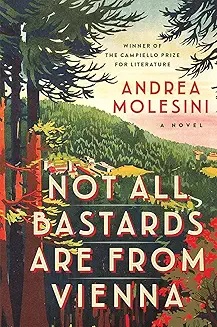Dear Commons Community,
I have just finished reading Andrea Molesini’s novel, Not All Bastards Are From Vienna. Molesini is a professor of comparative literature at the University of Padua. Not All Bastards.. won a number of literary prizes when it was first published in 2010. The setting of this book is a small village outside of Venice in 2017 during World War I that has been overtaken by German and Austrian troops. The story focuses on three generations of the Spada family as they struggle to survive the brutality of the war. There is sadness, humor, and stark realism in this book. The last sixty or so pages are riveting.
If you are at all interested in the World War I, you will enjoy Molesini’s book.
Below is a review that appeared in The New York Times when Not All Bastards.. was first translated into English in 2016.
Tony
—————————————————————————————————————-
The New York Times
Not All Bastards Are From Vienna by Andrea Molesini
By Katherine A. Powers
Jan. 29, 2016
“Not All Bastards Are from Vienna,” winner of Italy’s 2011 Campiello Prize, is Andrea Molesini’s first novel for adults — though it still possesses the straightforward narrative line and colorful characters of a story for children. Set during World War I, events are related by 17-year-old Paolo Spada, recently orphaned and now living with a menagerie of relations and servants in the Villa Spada, in a small town north of Venice.
First, though not foremost, among the Spadas is Grandpa Gugliemo, Paolo’s anticlerical, acerbic-tongued great-uncle. He is married to Grandma Nancy, “a white-haired panther of a woman,” a mathematician and a devotee of enemas. Then there is Aunt Maria, “the victim of a haughty manner,” a powerhouse who runs the place. The family is served by Teresa, blocky, resourceful and loyal, and by her daughter Loretta, resentful and moonstruck by the estate’s steward, Renato. He is a wily character and, as we discover, an Italian intelligence officer. Other key players include lush-bosomed, high-spirited Giulia, six years older than Paolo and the object of his urgent passion; the village priest, Don Lorenzo, well fed and authoritarian; and, finally, a lurking presence attached to Grandma Nancy known as the Third Paramour.
A German officer’s monocle glinting in the night sets off the plot. It distinguishes the horse-mounted person of Captain Korpium, fresh from victory at Caporetto, Italy’s humiliating defeat by combined German and Austro-Hungarian forces in November 1917. He has come to requisition the Villa Spada for his fellow officers and to quarter his troops in the village. The family is forced to squeeze itself into a couple of rooms, and there is much German smashing of furniture and seizing of valuables, though Grandma’s cache of jewels and coins in an enema bag remains undetected.
Notably, the family is spared the brutality, rape and methodical pillage suffered by the common people. Of these atrocities we get some dreadful glimpses, but much of the novel dwells on the Spada household’s domestic arrangements under German and, later, Austrian occupation. Food is scarce, but the black market and Teresa’s gift for producing nameless roasts mean they do not starve. Their greatest trial, until events turn lethal, is the feeling of degradation: A soldiers’ latrine abuts the Spada graveyard, and the family is forced to attend a dinner, in their own dining room, honoring Otto von Below, the victor of Caporetto.
An air of suspense gathers as the Spadas and friends are drawn into the Italian resistance, eavesdropping, sending coded signals and carrying messages. Eventually, Paolo is sent on a desperate mission to assist a British airman — and the family oversteps the boundary of immunity granted by their class with fatal consequences. Some 20 miles away, the Battle of Piave of June 1918 has commenced. It was here that the Italians, strengthened by Allied support, reversed their enemies’ seemingly unstoppable advance in a victory that struck a mortal blow to the Austro-Hungarian Empire itself.
As events unfold, various characters observe with sorrow that this war is destroying the old order and its civilized way of life. Still, we never sense that so much as we do the immemorial horrors of battle; the motivation behind betrayal, of which there is a calamitous instance; and the appetite for vengeance in even the noblest heart. Based on the reminiscences of an actual Maria Spada, “Not All Bastards Are From Vienna” is not a deep novel, but is wonderfully alive — often terribly so — as a wartime adventure and story of youth arriving at manhood.



